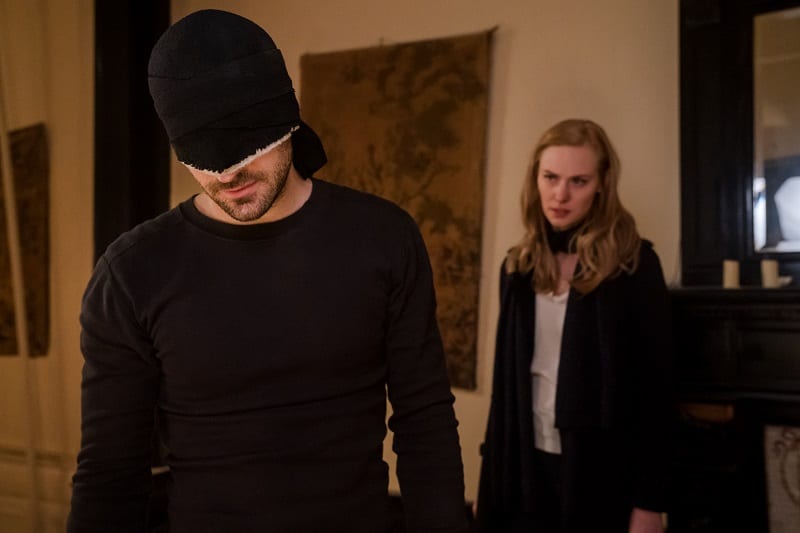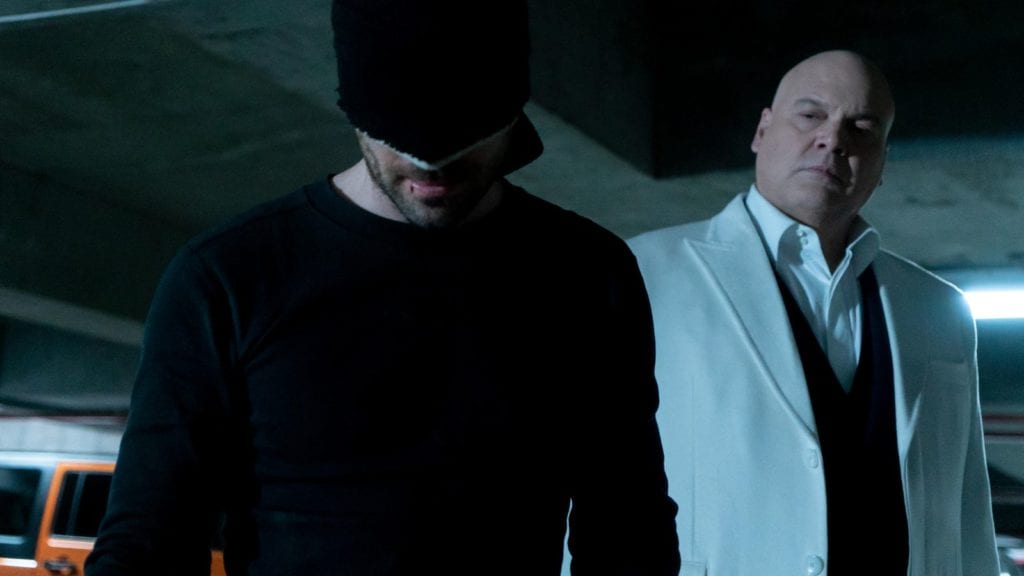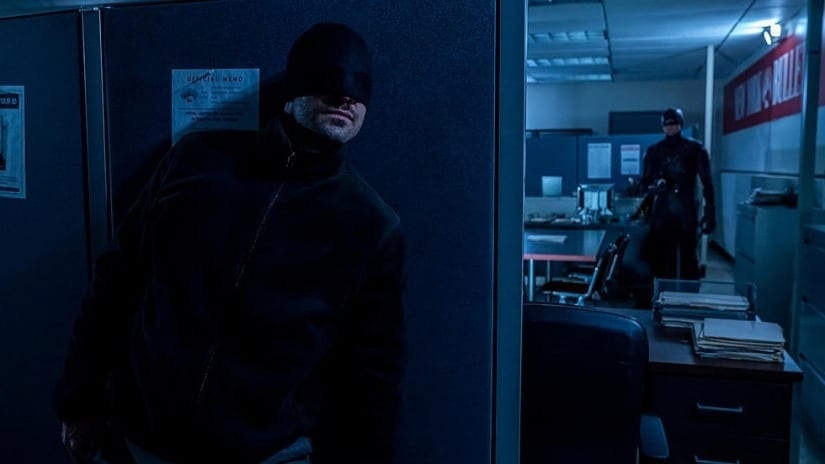I had a lot of hope and hesitation heading into the third season of Daredevil. With all due respect to the wonderful first season of Jessica Jones, Daredevil has been by far the most consistently good show Marvel puts on Netflix. I had good reason to hope the third season would continue the trend. And yet, the declining overall reliability of Marvel on Netflix worried me. Could Daredevil break the trend?
Yes, yes, yes. Daredevil constructed a fantastic season you could easily argue not only as the best yet for Daredevil, but the best season of any superhero show ever.

The Angel on Our Shoulder
How did they do it? By doubling down on everything that made the first season so good. After the second season’s disappointing adventures with the Hand, Daredevil went back to the themes and character traits which stood out so positively when the series kicked off the Marvel Netflix experiment. Namely, they went back to one key trait for Matt Murdock they let fall aside in season 2.
Matt Murdock is a guilty, suffering Catholic, and boy does season 3 remind you.
It starts with the direct aftermath of the end of Defenders. The Hand building explodes, Matt and Elektra are buried beneath it, only Matt survives in a scene that literally looks like him falling into Hell. He survives, of course, and manages to tell a passerby to bring him to his childhood church run by Father Lantom. Within minutes he’s meeting Sister Maggie, swearing off God, and setting up his internal conflict for the next 12 episodes.
The first and last scenes very much establish season 3 as one of resurrection for Matthew Murdock. More than ever before, he views his costumed persona as a devil within him. Daredevil plays this conflict for everything it is worth. He renounces God. Hallucinations of Fisk encourage Matt to give in to his worst instincts, while hallucinations of his friends sway him away from them. He casts aside the red devil suit. For most of the season, his hideout is Father Lantom’s church.
Season 3 is one of genuine, difficult soul-searching for Matthew Murdock. He spends every scene from the first to the last in conflict over whether he should be Matt Murdock or Daredevil, and it’s one that is only tentatively resolved. He spends it with his soul on the brink, as Matt struggles with maintaining everything good about Matthew Murdock rather than give in to the Devil he represents while costumed. There’s an acknowledgement of the violence and anger within Matt that truly drives him to dress as Daredevil, and this truth is what he fights against.
The season begins in a church and has a major climactic moment occur in the same church. Even more than the first season, it relishes in a visual style of reds and blacks, with symbolic moments involving crosses and coffins. Matt very much battles the devil inside him, both figuratively and literally. Even when he would be better off not fighting, he chooses to anyway.
He spends all season fighting this fight. It’s a familiar theme from season 2, especially, but done with a much better skill. Matt feels at home with suffering. He feels at home with guilt. And damn if guilt doesn’t drive him in season 3.
Daredevil does an excellent job of bringing home all the guilt at the core of Matt’s being. The guilt over his father’s death, over his deteriorated friendship with Foggy and Karen, over Fisk, over Elektra and Stick, over basically everything that has happened since the day an accident blinded him. Season 3 directly references much of this throughout the season while subtly implying everything else. Matt willingly wallows in all this guilt as a form of penance. He walks a hard, jagged road to save his very soul. Daredevil does a fantastic job making you feel every step he takes, forward and back.
And it’s not just Matt; every character is driven forward in some way by guilt. Some by their own guilt, some by others, but they all trace back in some way to the consequences of previous actions and the guilt they feel over them.
More than any other season before, Daredevil truly fleshed out and found a home for its side characters; a home embedded in the same idea of guilt over their pasts. Foggy Nelson has by far his best season as he fights Fisk’s release from prison. Karen finally receives a fleshed out backstory that not only gives her terrific material this year, but retroactively improves everything about her actions in the two seasons prior. I mentioned in my Defenders review how weird I found it for her to call Matt’s vigilantism an addiction. Well, not so much anymore.
Both characters struggle with doing the right thing despite obstacles both internal and external. They each face their own difficulties in addition to their efforts as the better angel on Matt’s shoulders. Foggy’s family receives focus as his famed opposition to Fisk puts their futures at risk. Karen’s past family life and role in her brother’s death inform on her decisions, while events throughout the season play on this already existent guilt.
The result ties the main protagonist trio together better than any season before it. They have never felt so thematically or narratively connected.
For those who read Katie’s excellent Lord of the Rings re-read project, there’s a familiar element to the concept of failure and grace Tolkien describes in her latest chapter re-read. Matt, Karen, and Foggy know they are outmatched by Fisk. There’s a sense of inevitable failure in their efforts. Yet, they trudge along out of a sense of self-sacrifice towards something better. Maybe they won’t succeed, but they hope that by continuing this moral course, they will at least inspire action in others. For such a devoutly Catholic character as Matt Murdock (despite what he says throughout the season), there’s an element of what Tolkin describes grace as, of walking a path that puts him in position to receive divine intervention.
It makes for the most openly Catholic season of Daredevil yet, as seen in the expanded role of religious figures in the story this season.
On the side of our heroes are Sister Maggie and Father Lantom, who provide the largest religious presence the series has ever attempted. Season 1 had its share of Matt/Lantom scenes that were always compelling, but they were more of a side attraction, a way for Matt to bounce fears and insecurities off a religious character as part of the Devil motif. Season 3 gives these scenes a real focus. Maggie and Lantom try desperately to serve as Matt’s moral North Star.
There were many hopes for Sister Maggie, and expectations based on the Born Again comic plotline serving as inspiration for elements of this season. While I can’t speak on those comparisons, Sister Maggie immediately jumped off my screen and was easily one of my favorite characters. She harbors her own significant guilt over past actions. Not to mention, like any good nun, she wields guilt as a weapon better than any master sharpshooter.
Daredevil also doubles down on the foils for Matt/Daredevil. Fisk returns and is every bit the brilliant foil he was in season 1. Season 3 also adds a classic Daredevil villain in Ben Poindexter’s Bullseye, who is given a childhood history similar to Matt’s. Fisk eventually gives Poindexter a copied Daredevil suit as part of a ploy to discredit the Daredevil name.
The intent is clear; Poindexter shows us who Matt would be if he gave in to the devil within. Matt never wears his classic red devil costume and instead has multiple fights against Poindexter while the antagonist wears the suit. Matt Murdock literally fights his devil throughout the season. He battles the person he would be if Stick or Elektra had gotten their way.
This is a season of battling demons. Some failed long ago. Some fail throughout the course of the season. Many of the heroes overcome them. There’s no doubting the intense focus season 3 takes, though, or how well it executes that focus.

The Devil in Our Ear
Not every character fully succeeds, unfortunately. I understand and appreciate the purpose of FBI agent Ray Nadeem, but his character is so steeped in generic traits that I found it hard to engage with him. Your mileage will vary here, for sure. Some will like the federal agent who turns a blind eye to corruption in order to help his family and such, but I’ve seen this story before. I’ve seen it done better.
He also symbolizes the larger, continued problem these shows have with law enforcement. And to be fair, season 3 of Daredevil handles the law much better than other shows have. It still isn’t particularly good. The level of corruption and absurdity at times just makes me laugh. The reasoning for it all existing just doesn’t hold up well to scrutiny.
I understand a lot of this owes to comic tropes carried over for the good of the story. Fisk needs to be this powerful and have immense leverage over federal law enforcement in order to make a hero like Daredevil necessary. Daredevil, to its credit, does make it more plausible than others. Fisk owns the right people at the right positions with the right leverage. I still don’t find any of these characters particularly compelling, and no tearful monologues about threats to their family will change that. They simply don’t match the dramatic gravitas of Fisk, Matt, or any of the other main characters.
As with any superhero show, you’re also going to run into moments testing your suspension of belief. How did they not get caught here? How did a character not know this there? Why did they not just shoot these characters? Again, season 3 of Daredevil does an admirable job limiting these moments or distracting with good content. They still exist, though, and individual ability to ignore it will vary.
I also thought season 3 missed some serious opportunities. As important as Sister Maggie is at the beginning and end of the season, she kind of vanishes in some middle episodes and her presence is missed. I also thought they whiffed on a revelation about her at the end of the season. The focus is instead placed on Father Lantom’s knowledge of this secret. By the time the proper confrontation happens, it’s anticlimactic. The thematic and narrative resolution has occurred and the conversation no longer means what it should have.
Sister Maggie is incredible, but she should have been better.
I’m also a bit iffy on Poindexter’s character. He falls victim to much the same flaw that Ray Nadeem does. Plainly, he’s generic. He has mental health problems at a young age, suffers tragedy, does bad things, and suffers with healthy empathy. He stalks a woman. Poindexter basically serves as a bad guy looking for a good woman to make him better. There’s certainly more to him than that. Elements exist for a more compelling character. I just felt like Daredevil fell a bit short with their intent with him.
And that’s fine. Poindexter is not the main villain. He basically serves as a mirror for Matt. He serves this function admirably. Considering how much screen time he receives, he is an area that could have been improved, though.
I also think the individual plot beats don’t really strive too far outside of a generic comfort zone. They still work really well because Daredevil does an outstanding job making familiar plot points compelling. Still, this is the third season now where Matt has struggled with killing vs. not killing. He again struggles between Matt Murdock and Daredevil. Karen again struggles with direction in her life. While certainly upped in scale, Fisk’s corruption and threat remains familiar to the first season.
If you’re looking for innovation, I don’t think season 3 of Daredevil offers it. It pulls its punches in some areas it would have been better off not, and doesn’t deliver on the promise or expectations of some characters.

A Better Devil
Ultimately, these flaws are not serious but rather hiccups keeping Daredevil from entering legitimate great drama conversation. This season was highly impressive. I don’t hesitate to call it the best season of superhero TV I’ve ever seen.
Daredevil has always strove for something a bit more than its counterparts. There’s an element of effort to the dialogue, plotting, direction, cinematography, and acting that other superhero shows arguably lack. They may not always hit, but they always take a swing. Of course, not all these shows try to be what Daredevil does. They want to be campy, or they want to be more comic-y. They may try for riffs on Blaxploitation like Luke Cage does. They may care more about being a fun, entertaining show than anything trying hard to speak out on society.
It does come down to taste, but for my taste, Daredevil is as good as it gets. And season 3 was as good as Daredevil gets.
This felt like both a lesson learned from past mistakes, as well as a culmination of everything previous seasons did right. It just feels right, like the show finally hit its groove. The fight scenes were the best they’ve ever been. The characters fit together better than ever. It hit visual high marks. Everything gelled into a new high-mark. Season 3 even solved the pacing problem plaguing the Marvel Netflix shows.
With the cancellation of Luke Cage and Iron Fist, the fate of all these shows remains up in the air. Will Netflix cancel all their Marvel shows due to Disney’s impending streaming service? If Daredevil on Netflix has to end here, it picked a great place to do so. Season 3 of Daredevil was the best thing Marvel has yet put on Netflix. It feels like an improvement of everything preceding it.
I hope we get more. I want to see if Daredevil can improve yet again. If so, we may be looking at the first legitimately great superhero drama.
Images Courtesy of Netflix

